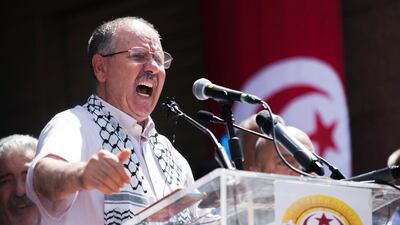The leaders of the powerful Tunisian General Labour Union (UGTT) will convene on Friday to draft a response to the country's president and to “respond to the systematic targeting of the workers' organisation”, Assistant Secretary General Hfaiedh Hfaiedh told state press agency TAP.
The meeting will bring together the union’s administrative authority, the highest decision-making body that sets policy for the body able to mobilise many of its million members and holds significant power within the country.
“The Tunisian presidency is targeting the union [while] the union has called for a national dialogue [but] the authority declared war,” Mr Hfaiedh said in a statement published on social media.
The union boss' statement and declaration come after President Kais Saied accused certain members of abusing their position to call strikes and mobilise chapters to further political aims and settle scores.
“Union members' rights are guaranteed by the constitution but it cannot turn into a cover of political aims that are no longer hidden from anyone,” Mr Saied said during an unannounced visit to L’Aouina military base in Tunis where he met with high-ranking security officials.
“Those who block roads and railways or threaten to do so under false pretences cannot remain outside the circle of accountability,” he added.
UGTT leaders described Mr Saied's accusation as a familiar attack from leaders trying to target the workers' organisation.
But union mouthpieces echoed Mr Hfaiedh's comments on Thursday morning.
“L’Aouina speech: A Declaration of War,” ran the headline in red on the front page of the union's official Echaab newspaper.
Members of the union's executive body also rallied on social media to express their anger at the president's comments and decry “the provocative and inflammatory rhetoric stemming from the Presidency of the Republic”.
The latest row comes merely days after the arrest of the general secretary of the union’s highways branch Anis Kaabi at his home on Tuesday.
Tunis Court of First Instance said that Mr Kaabi had been detained after two complaints against him were filed by the legal representative of the Tunis Highways Company for ”conducting harmful behaviour to the rights and interests of others“.
While the Interior Ministry and police haven't commented on the arrest, union official Hamza Al Mahmoudi claimed it was due to a continuing strike by motorway toll booth operators that is costing the government too much in lost revenue.
It comes as the UGTT has taken an increasingly vocal stance against to president's economic reforms and his new political system brought in last year that grants him greater authority at the expense of parliament and the judiciary.
While the union has been instrumental in brokering political compromises since the 2011 revolution brought down longtime president Zine El Abidine Ben Ali, it has also proven its ability to paralyse the country with widespread strikes.
While it is increasingly critical of the president, the UGTT has yet to call for a major campaign of strikes or to explicitly target Mr Said's political agenda.
However, Mr Hfaiedh said that more strikes were likely after Friday's meeting as the union takes actions “it deems necessary to halt all grievances and violations of public freedoms and trade union rights”.
Mr Saied shut down parliament in 2021, seizing most powers and moving to rule by decree before writing a new constitution that was passed at a referendum last year that had a low turnout.
He has ignored repeated demands by the UGTT, Tunisian National Lawyers Bar, the Human Rights League and the Tunisian Social Economic Forum for a national dialogue to resolve Tunisia’s internal political disputes.
The rift has led some observers to compare the situation to the lead-up to the “Black Thursday” riots in 1978 in which workers striking over the economic crisis clashed with former president Habib Bourrguiba’s security forces leaving dozens dead and wounded and most senior UGTT officials in custody.


